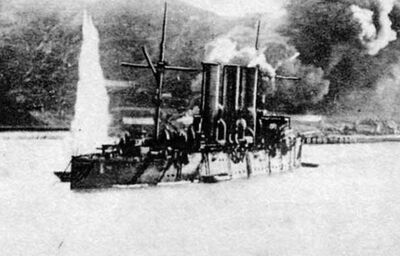Second Battle of Dragovich
| Second Battle of Dragovich | |||||||
|---|---|---|---|---|---|---|---|
 HMNS Orion under fire from Molvanian defences in Dragovich | |||||||
| |||||||
| Belligerents | |||||||
|
|
| ||||||
| Commanders and leaders | |||||||
|
|
| ||||||
| Units involved | |||||||
|
Molvani Fleet | Dragovich Garrison | ||||||
| Strength | |||||||
| 36 ships, 22,000 marines | 15 ships, 3,000 men, 18 shore emplacements | ||||||
| Casualties and losses | |||||||
| 2 ships badly damaged. 1,934 Killed and Wounded | 5 ships destroyed, 10 ships captured. 401 Killed and Wounded, 14,255 Captured. | ||||||
The Second Battle of Dragovich was a major engagement of the Third Vionnan-Molvanian War fought between forces of the Imperial Navy and Imperial Army Marine Corps against the Molvanian Northern Squadron and garrison of the port of Dragovich. The battle, fought on the 25th of March, 1897, ended in an Imperial victory albeit with many casualties. The port of Dragovich was captured along with 10 Molvanian ships and their crews at the cost of almost two thousand men and heavy damage to two ships.
Background
Opposing Forces
Dragovich Expedition Order of Battle
Imperial
The Imperial Navy arrayed a force of 36 warships, organised into the Molvani Fleet, a formation of six battleships, ten cruisers and twenty destroyers. Pre-war planning by the Admiralty estimated that this would be the minimum fleet strength required to defeat the Molvanian Fleet of Interception, a formation designed to respond within hours to any naval threat and to intercept it. Unbeknownst to the Imperial Navy, due to outdated intelligence, the Fleet of Interception had been disbanded in 1896 to reinforce the understrength squadrons of the Molvanian Western Fleet.
The Molvani Fleet was commanded by Rear Admiral William Porter, a former merchant captain of insignificant middle-class heritage. He was appointed to the position despite being of completely insufficient rank and without previous combat experience. Evidence suggests that he was chosen to prevent his opposition to various noble-born officers and their politiking had Porter moved to his position without sufficient preparation or experience.